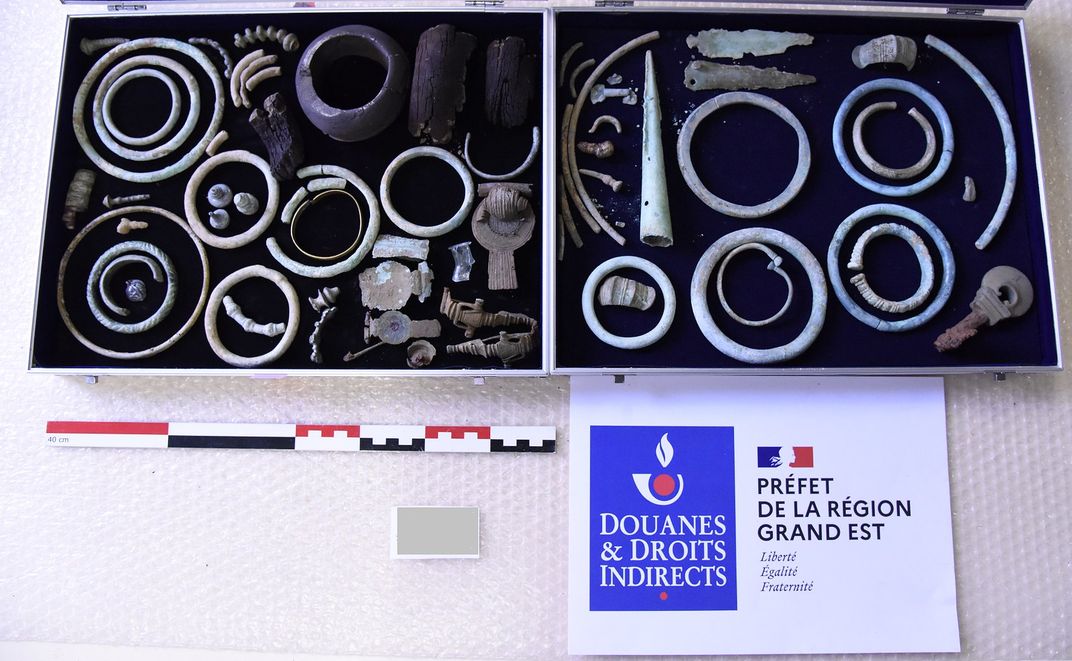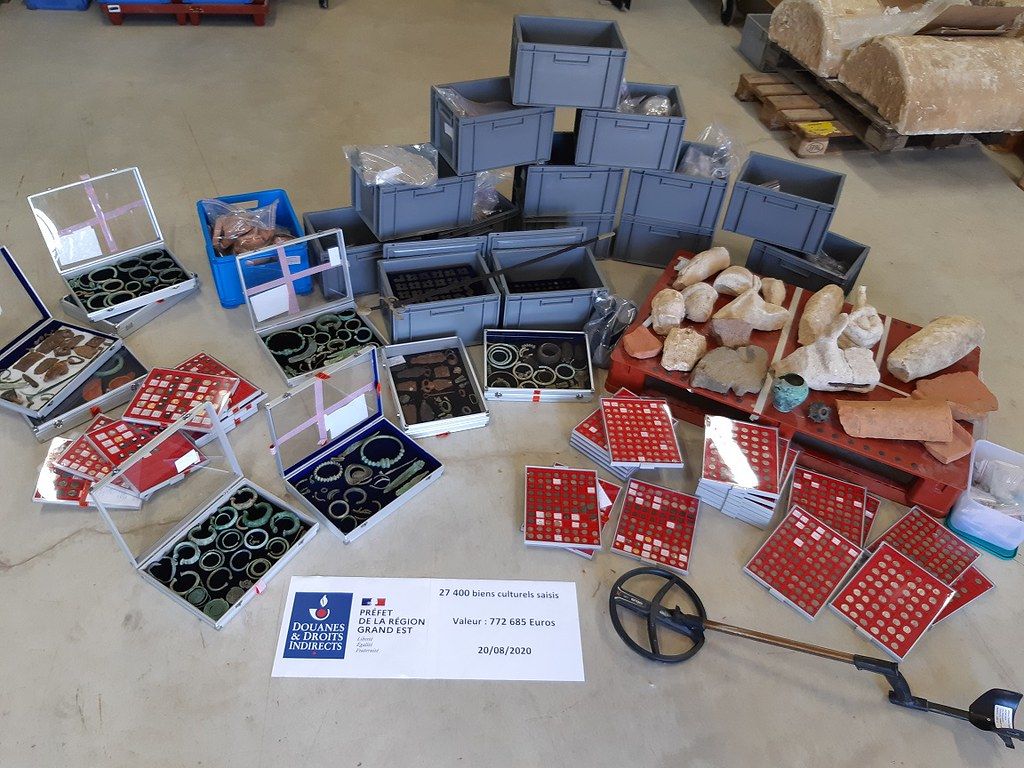Officials Seize 27,400 Artifacts Looted by a Single French Treasure Hunter
The unidentified man accumulated a sizable collection of ancient coins, jewelry, accessories and sculptures
:focal(380x258:381x259)/https://tf-cmsv2-smithsonianmag-media.s3.amazonaws.com/filer/90/c5/90c525cb-3d4b-47f2-a852-cbd7dcf69d85/50568851688_c02380109d_c.jpg)
French authorities have recovered a trove of more than 27,400 looted objects of “inestimable value,” according to a statement released this week. A man identified only as Patrice T. amassed the collection of artifacts, which included Bronze Age jewelry, statue fragments and Roman coins, for personal use and trading purposes, reports Agence France-Presse.
Last fall, Patrice—a Frenchman living in Belgium—told investigators that he’d used a metal detector to unearth 14,154 Roman coins at his recently purchased apple orchard in Gingelom, about 40 miles east of Brussels. But his claims raised suspicions, and officials at the Belgian Agency for Immovable Heritage decided to coordinate with French customs officers to inspect the find.
As Daniel Boffey notes for the Guardian, using a metal detector for anything other than scientific research is outlawed in France. Under Belgian law, however, personal use of metal detectors is permitted, and treasure hunters who uncover objects on their own property are legally entitled to those items.
Per a translation by artnet News’ Sarah Cascone, archaeologist Marleen Martens, one of five experts sent to investigate the hoard, tells French newspaper La Voix du Nord that Patrice “opened the car trunk and showed me two enormous plastic buckets filled to the brim.”
She adds, “I had never seen so many coins.”
As officials inspected the site, Patrice’s story quickly fell apart.
“During the site survey we concluded that it was impossible for the coins to have come from this site,” Martens tells Geert Sels of Flemish newspaper Het Nieuwsblad, as translated by artnet News. “They were located in an Earth layer that was formed after the Middle Ages. A few coins could exceptionally still [turn] up. But 14,000?”
Later, when French authorities searched Patrice’s home, they found more than 13,000 other rare objects, including Bronze and Iron Age bracelets and necklaces, Merovingian buckles and belts, and assorted items dated to the Middle Ages and the Renaissance, per La Voix du Nord. Overall, Het Nieuwsblad reports, authorities estimate that the stash is worth around €772,685 ($946,670).
Among the artifacts recovered is a rare Roman dodecahedron, or hollow copper object possibly used as a weapon or measuring device, as scholar Michael Guggenberger wrote in a 2013 Mathematical Intelligencer article. Only 100 of these mysterious artifacts are known to still exist. Also present were brooches, or fibulae, used to fasten cloaks around wearers’ necks, and neck ornaments known as torques.
In the statement, officials say Patrice accumulated the artifacts by personally looting sites across France. He then took advantage of differing regulations in France and Belgium to avoid yielding his ill-gotten goods to the state.
The 2019 discovery was far from the first time Patrice had unearthed rare treasures. In 1993, according to Het Nieuwsblad, he dug up 5,250 coins from the third and fourth century A.D., then claimed to have “found” them by a road in Pierreville. The French commune’s mayor allowed him to keep the coins.
This time, Patrice—described by the Guardian as “one of the greatest archaeological looters in European history”—won’t be quite so lucky. As a spokesperson tells CNN’s Jack Guy and Pierre Bairin, France’s customs agency has concluded its investigation and plans to pass the case on to public prosecutors within the next several days.
“The offender is liable to imprisonment and hundreds of thousands of euros in customs fines,” says Bruno Le Maire, France’s economy minister, in the statement, per a translation by the Guardian. “This is a clear message to those who, for the benefit and selfish pleasure of a few, rob us of our common heritage and erase entire swaths of our history.”
/https://tf-cmsv2-smithsonianmag-media.s3.amazonaws.com/accounts/headshot/Isis_Davis-Marks_thumbnail.png)
/https://tf-cmsv2-smithsonianmag-media.s3.amazonaws.com/filer/3a/d6/3ad6d09c-5ef5-431b-a75c-0aa28011bfbe/50722739283_da242ed0fc_c.jpg)
/https://tf-cmsv2-smithsonianmag-media.s3.amazonaws.com/filer/0f/b0/0fb0be30-1965-4362-ac2e-5cda566d0b0d/50569734572_079e28332d_c.jpg)


/https://tf-cmsv2-smithsonianmag-media.s3.amazonaws.com/accounts/headshot/Isis_Davis-Marks_thumbnail.png)